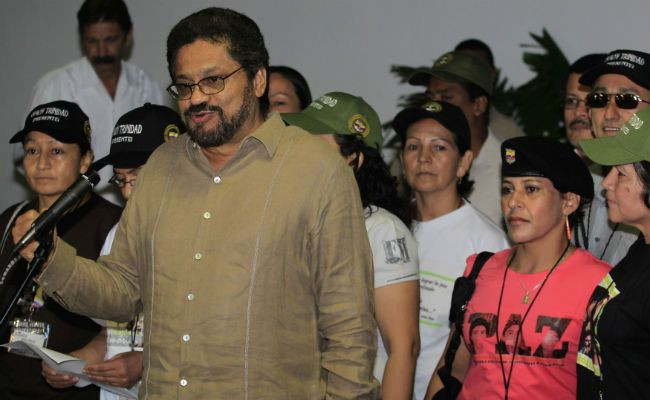
Colombia's FARC rebels freed three captive Chinese oil workers and their translator after holding them in jungle camps for more than a year, a police source said on Thursday, an apparent goodwill gesture as the rebels seek to negotiate a peace accord to end five decades of war.
The captives, who worked for a company hired by UK-based Emerald Energy, were taken hostage by the Revolutionary Armed Forces of Colombia, or FARC, in mid-2011 as they were driving in southern Colombia. The FARC handed their captives over to Red Cross workers late on Wednesday.
The government and FARC negotiators are meeting in Havana, Cuba, to hammer out a five-point peace plan that may bring an end to a conflict that has left tens of thousands dead and millions displaced since it began in 1964.
Vice Defense Minister Jorge Enrique Bedoya told reporters that the release was a result of collaboration between the Red Cross and the Chinese government.
"The government provided all the help possible so that this (liberation) could develop without any problems. We are very happy that these Chinese citizens can return to their homes," Bedoya said.
A decade-long government offensive against the FARC has pushed the rebels deep into inhospitable jungle territory, helping foreign and local oil companies and their workers drill more safely.
But the Marxist group has stepped up attacks against oil installations over the last year or so, bombing pipelines, kidnapping workers, and making it difficult for companies to maintain output levels.
The FARC pledged in February that it would no longer take hostages for ransom, one of the group's main sources of income along with drug trafficking and extortion, according to police sources.
Rebel leaders have repeatedly denied it holds any more captives since the release earlier this year of a group of military and police officials it held for more than a decade as bargaining chips against the government.
French journalist Romeo Langlois was freed by the FARC in May after a month in captivity. He was the highest profile hostage since French-Colombian politician Ingrid Betancourt was freed in a military rescue mission in 2008.
At the start of peace talks this week, the FARC ordered a unilateral ceasefire for two months and said it would call off attacks on military as well as economic targets, but police say the group has failed to keep that vow.
Still, the truce may provide a breather for oil and mining companies, many of which pay considerable sums for security to protect workers and installations.
The war costs Latin America's fourth-largest economy 1 to 2 percentage points of gross domestic product every year, according to the government, and makes large tracts of arable land unsafe due to combat or landmines.
© Thomson Reuters.




